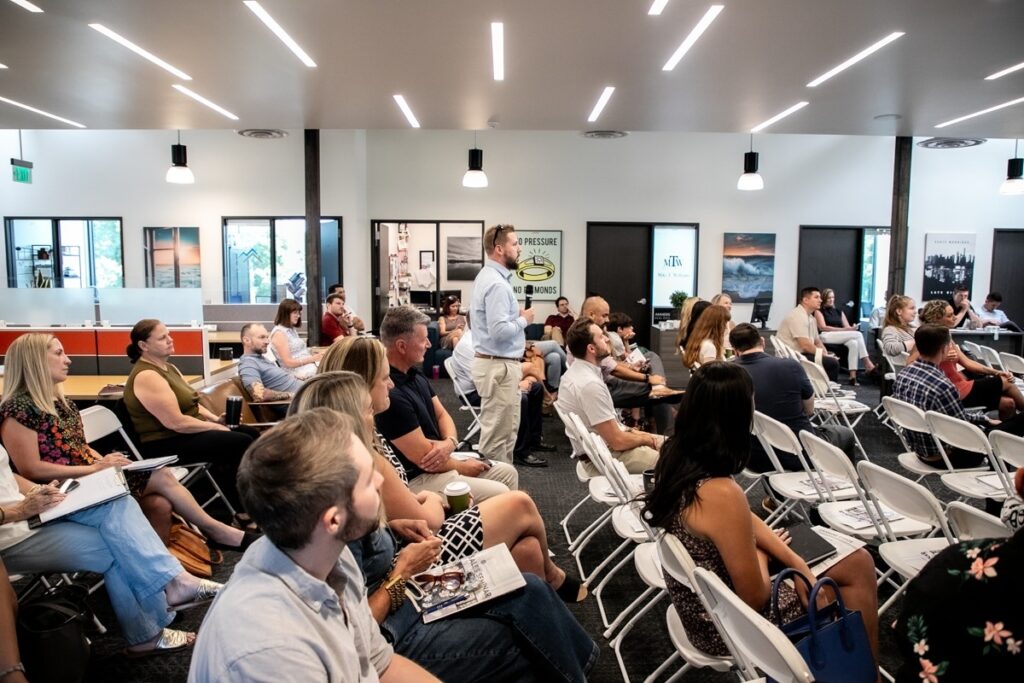What separates the “Good” from the “Great?”
As I stood on the sideline, waves of exhaustion spread over me. Every significant muscle group in my body was vibrating and seizing up in cramps, desperate to rid itself of the lactic acid which had been building through the last four hours of extreme taxation, heavy blows, and thunderous surges of adrenaline. I chugged water and electrolytes, breathed deep, and tried to replenish something before I made what was sure to be another trip out to the green dirt of The University of Phoenix Stadium (many football fans do not realize how much of that grass they see on television is not grass at all) to face the Sooners’ offense and powerhouse running back Adrian Peterson. As much as the competitor in me wanted to get back out there and take action, my cramping muscles and uniform soaked in blood, sweat, and vomit (most of the former being my own) were all indications that my effectiveness was rapidly diminishing. On the field, Zabransky took the offense to the line – preparing to go for two points and the win as opposed to playing for another overtime by kicking the extra point. I glanced over at my head coach, Chris Peterson, with a mixture of admiration and frustration. It was clear that he had the will to win and the courage to lay it on the line by taking a huge chance. He was leading by example and showing great faith in the eleven men on the field. He was also stating very clearly that he wanted the defense to stay exactly where it was – on the sideline in the cheap seats. A quick look around at the rest of my comrades who made up the “D-Unit” confirmed my sinking suspicion that they felt as bad as I looked and felt.
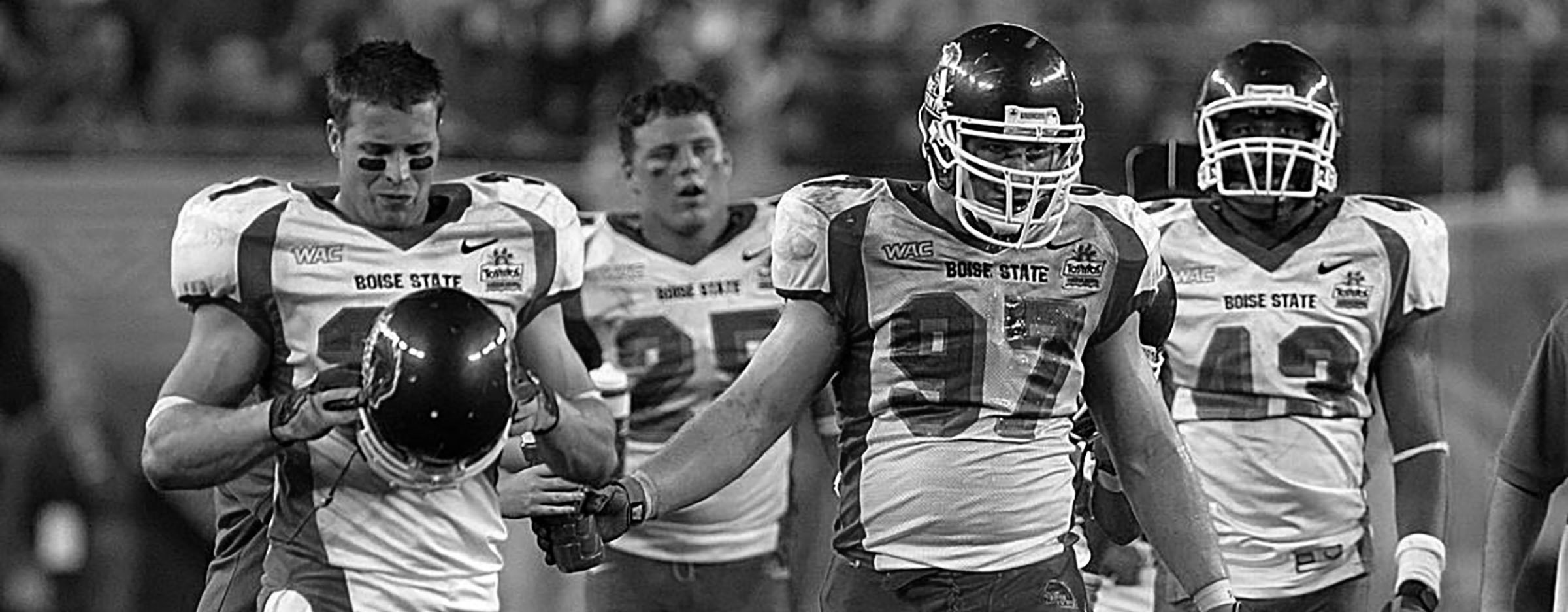
I shook my head with rueful understanding and brought my full attention to bear on supporting my teammates on the field, who were about to take part in one of the most important single plays in the history of Boise State Football and what would become part of college football lore.
The ball is snapped. Jared and the remainder of the offense carry out their assigned feint with precision. Key blocks are executed on the edge by Derek Schouman, Ryan Clady, and Tad Miller. Ian Johnson waltzes his way onto the Bowl Championship Series logo in the end zone, untouched. Pandemonium. Euphoria. Greatness.
The Greatness Gap
I had been a part of winning teams before. In fact, winning has come to be something that I not only seek out but expect. Through athletics and from the age of seven, I have been a part of district championship teams, state championship teams, undefeated teams, teams that broke records, programs ranked in the top 1% nationwide at both the high school and college level, and the finest college football team in the country, which took the field against OU on January 1, 2007 (yea I said it, THE best, final AP ranking of No. 5 notwithstanding ). My experiences on winning teams and participation in great programs extended beyond athletics and has continued throughout my professional life. I have joined in brilliant scholastic achievements through my undergraduate studies at Boise State University and my graduate studies of real estate development at the #22-ranked university in the nation, Georgetown University. I joined a group of some of the finest men and women on the planet in emergency services through my time as a full-time firefighter and EMT at the Boise Fire Department, where we worked in cohesion through dangerous and difficult circumstances to extinguish raging fires, perform emergency medical care, and always show up when called upon. Now, fully immersed in the support and growth of our team at Amherst Madison, I have the pleasure of striking out to have a meaningful impact in our community and our industry, while being surrounded by the most productive, professional, and philanthropic real estate professionals in Idaho.
As instructive as these experiences have been, it has been perhaps even more enlightening to work in and around teams that never quite make it to greatness or even become bogged down in mediocrity. Professionally, athletically, and personally, I have struggled alongside team members and co-workers who could never quite make it to the next level. For some groups it was due to a lack of desire; and for others, through no lack of effort at all. Many of these teams were good, some of them very good, but none of them could break through this invisible wall that separated good from great, where true excellence is found. Unblemished records, outstanding and consistent performance, it all remained elusive and just outside our grasp.
As I pause to reflect on these groups – the ones who “made it” and the ones who did not, I find myself asking the critical question of “why.” Why did just a few teams and individuals succeed in finding greatness, while so many others were mired in mediocrity or satisfied with just “good?” Why and how were the ones who were able to break through, capable of moving through seemingly impenetrable barriers to achieve levels of excellence, which were, in some cases, astonishing? What was it that created this barrier, this Greatness Gap, which seemed to prevent the majority of people from ever reaching the top? I generally think of the Greatness Gap as the last 10%, from 90% to 100%, that someone must climb in order to achieve greatness. Ninety percent is just “good,” and many become stuck there or decide that good is good enough. Jim Collins puts it succinctly:
“Good is the enemy of great. And that is one of the key reasons why we have so little that becomes great. We don’t have great schools, principally because we have good schools. We don’t have great government, principally because we have good government. Few people attain great lives, in large part because it is just so easy to settle for a good life.”
Typically, it is ten times more difficult to move from “good” to “great.” That last 10% up the grade, from 90% to 100%, is not for the faint of heart. Only the determined few will see triumph here. Stated differently, it is relatively simple, although not always easy, to be “good.” To be excellent, however, is something altogether different.
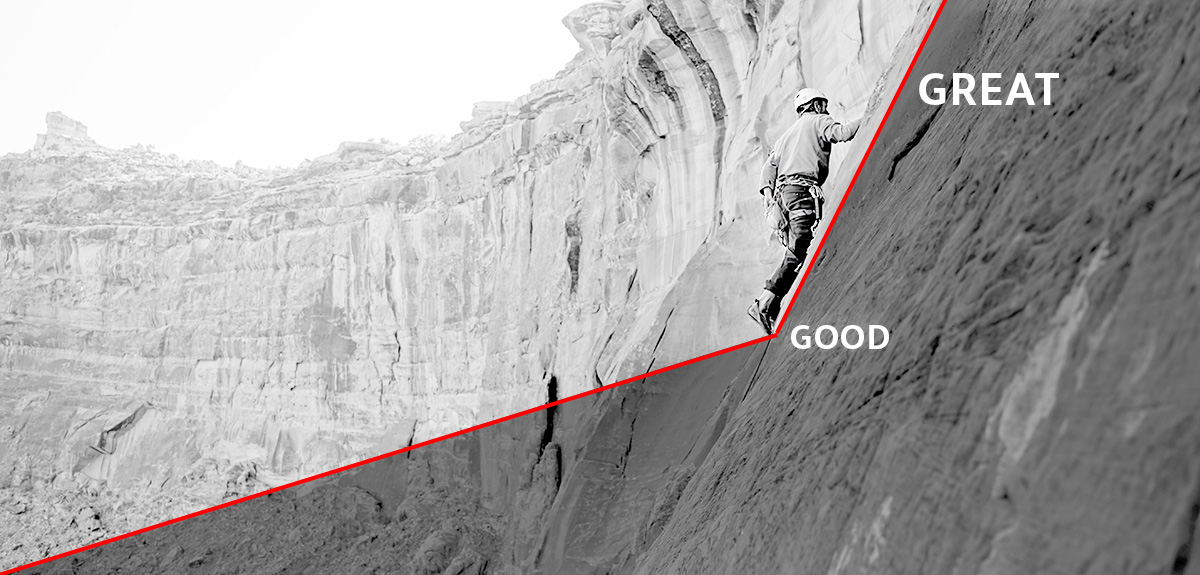
My professional work has included a lot of research into the differences between teams and individuals who achieve excellence vs those who struggle to achieve distinctive success. I am certainly not alone. Jim Collins, acclaimed author of “Good to Great;” Darren Hardy, “The Entrepreneur Roller Coaster;” and Jocko Willink, “Discipline Equals Freedom” all come to mind as accomplished figures who have written and studied extensively on human performance and greatness. They have certainly helped my understanding of the topic. Their work, the work of other experts, along with my personal experience and reflection, has revealed to me a very clear differentiation between those who do and those who do not achieve greatness. Before we explore which behaviors, habits, or environments can be found in the Greatness Gap, we should take a look at a few things, often misapplied, that do not create the edge most of us seek.
Not Enough For Greatness
These things are important characteristics or behaviors that will help make you good. Indeed, all of them are necessary ingredients to achieving both proficiency and excellence. However, none of them represent the key differentiation that propels someone from the 90th percentile to the very top.
- Desire – Nope. Not enough. To want, to need, even to obsess, is not enough to take you to the top. If it were, the top would be a lot more crowded. Think about it for a second. Who doesn’t want to be the best at their craft? Who actively wants to be mediocre or “less than?” Everyone wants to be the best. Everyone wants to be a champion, but very few are willing to pay the high price of excellence. His recent personal struggles aside, this is one of my favorite quotes/clips of all time that is very rarely shared or seen, because it calls out the false prophets of social media who exist to sell you products or ideas based on impotent motivational rhetoric: “To want. To be ambitious, and to want to be successful… is not enough.” – Kevin Spacey.
- Hard Work – Ouch. Big Ouch. Trust me – this hurts me more to say than it does for you to hear. You are reading from someone who is currently immersed in a massive battle to shift their entire sense of self-worth away from something that is based solely on how hard they can work to how much impact they can have on people. Why? Because after decades of outworking the competition and burning the entire candle (forget about both ends), after a childhood based on valuation (and evaluation) commensurate with the grind, after periods of mind-altering burnout, I have discovered something monumental. Hard work is not enough. Hard work will not get you or me to the top of the rock. In fact, there is a steep diminishing of returns found in extreme levels of work where fatigue and obsession greatly diminish your overall effectiveness. This can be a dangerous spiral for those who have achieved success due to hard work (hint: nearly everyone who has achieved success). Previous success, attributed solely to how hard you work, is positive reinforcement for working harder, which works right up to the point where it doesn’t. Then you wind up with some very difficult growth decisions to make. If you ever find yourself there, look up my old address, I was a full-time resident for about 15 years.
- Luck and Fortune – No chance. I almost left this one out because I think the word is pretty much on the street that you cannot luck your way to success at a high level. Luck and good fortune can win a few battles for you, but it is a fickle beast that will turn on a dime. No – those who achieve consistent levels of high performance do so in spite of fortune, not because of it. My favorite quote about luck comes from Vince Lombardi. Ok, I lied. This is actually a quote from the Roman philosopher Seneca, but Vince was the man, so I had to give him a shout-out: “Luck is what happens when preparation meets Opportunity.”
- Goal Setting – Negative ghost rider. Despite what generations of gurus may lead you to believe, goal setting by itself will do very little for a person. This is certainly not the difference between those who do and those who do not. In fact, in our society and culture, goals have become akin to desire and wanting. Most people who set goals never make the decision they will achieve them; and many times, they never even intend to achieve them. They are not worth the paper which they never get written down on.
Details – Winning in the Margins
I want to go back to our victory in the Fiesta Bowl and the famous Statue of Liberty Play. That play, along with the last couple minutes of the game, was summarized by the media and casual fan base as, “the underdog wins with trick plays.” Trick plays… as if Houdini has a place to hide in front of 75,000 people with 22 large men slamming into each other at full speed, but I digress. What everyone seemed to forget was what put us in a position to win the game in the final minutes. What gave us the opportunity to win was the same thing that made those “trick plays” work in the first place: discipline and attention to detail. That game, the majority of which was controlled by Boise State, those plays, executed nearly flawless, that entire season of zero losses, and indeed the entire careers of those Boise State players was controlled and dictated by our collective attention to detail. The discipline to do the right things in practice and meetings, during film sessions and visualization, thousands of times, no matter how tired or how hot or how beat up, on the field and off the field. Perfect? Absolutely not. Excellent? Most of the time. That discipline and those details culminated in something magical. The attention to detail of each player on the field, to do his job correctly despite his fatigue, because he had done it thousands of times before, is what crossed us over the Greatness Gap and into rare air. Not just the players. The coaches waging their own war of details. The truth is, BSU head coach Chris Peterson set the stage for the final play by running a completely different play out of the exact same formation, twice, earlier that season. Recognizing the personnel group and formation, OU coach Bob Stoops was confident that he knew what was coming. He did not. SB Nation did a good job pointing this out at 7:15 of this recap of the play. How impressive is this? After hours of intense focus and fatigue, both of these coaching staffs were drawing back on memories from film study of previous games and implementing strategy based on what they saw.
You see, anyone can do it when they feel like it, when they are motivated and have the desire. Anyone can work hard but fail to work smart and work with precision. Anyone can set big goals, dream big dreams, and shoot for the stars. It takes a rare individual to do the right things, at the right time, with fanatical consistency, even when he or she does not feel like it. These people are the ones who cross the Greatness Gap and go from good to great.
“Greatness is not a function of circumstance. Greatness, it turns out, is largely a matter of conscious choice, and discipline.” – Jim Collins, Good to Great.
I used to call it “winning in the margins.” It started in high school athletics but would quickly become the mantra of my personal and professional life. It became pretty obvious to me early on that I would never become successful at an elite level by relying on my talent alone (painfully obvious… really early… you get the drift). With that said, I did start to notice that most people simply did not pay attention to the little things, the marginal things, the seemingly unimportant details. The start of practice, the end of practice, the opponent’s behavior in film study, their body mechanics when walking down the hall, how much water they drank, how much sleep they got, and a host of other items. I started to wonder, if I started “winning” in all these marginal little side concerns and added all that up, what would happen? Then, something did happen! It started to work. Winning in the margins became just plain old winning. I liked it and so did those around me. I noticed, particularly on the winning teams over the years, that I was surrounded by people who also paid attention to the details and won in the margins, just like me. I developed a sense for who these people were and how to help identify them in a crowded world.
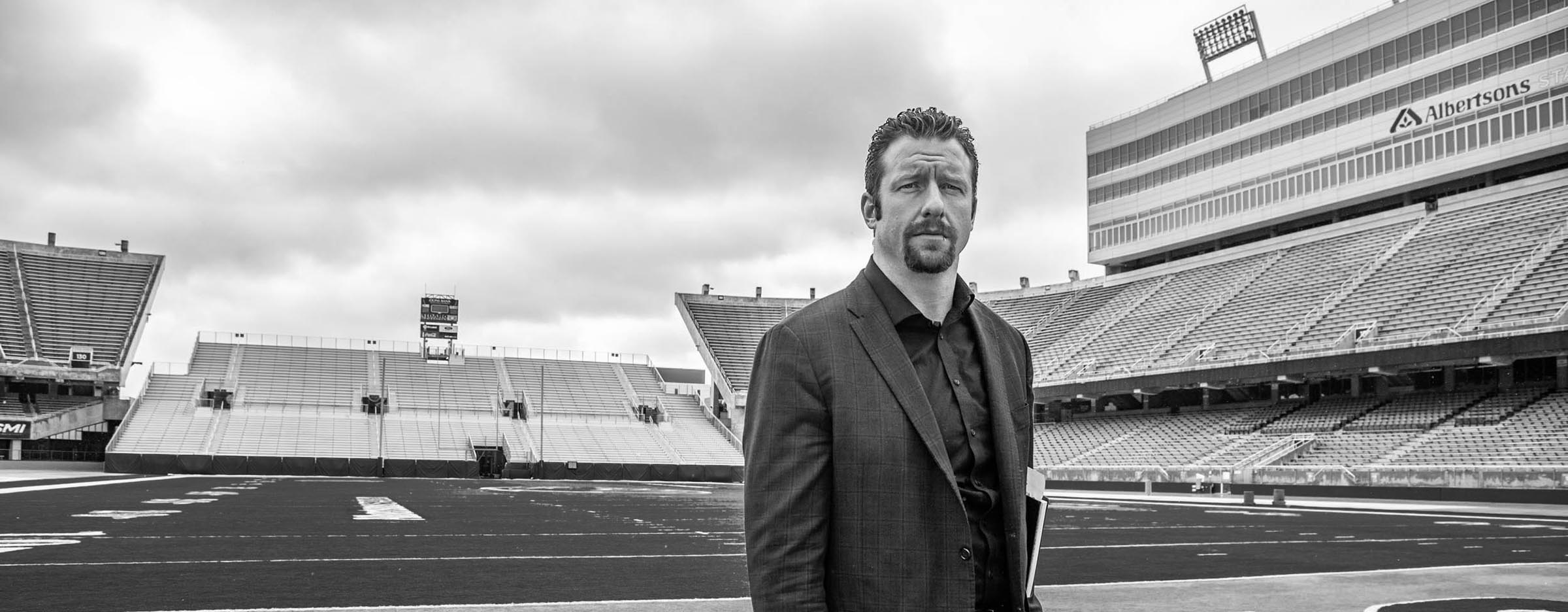
My personal favorite is what I like to call the “napkin test.” Throw a small napkin or piece of paper in the middle of an office hallway, room, or public place. Put it somewhere obvious and then see how long it takes before someone picks it up and throws it away. Try it out and you may be surprised just how long it takes for someone to take ownership of that napkin. If they do, that is a detail person. That is a person who likely understands something about what it means to win the margins. I once was the broker of a small real estate company and I executed the “napkin test” in the main hallway right by the front door. I was developing a suspicion about the nature of the types of people who worked in this office and their attention to detail. The napkin sat on the floor for a week with dozens of bodies crossing over it before I, disgusted and quite simply not being able to take it anymore, picked it up on my way out the door one night and threw it away myself. I resigned a week later. These were not my people.
It has been my observation that breaking through the Greatness Gap and achieving excellence is largely dependent on the habitual and disciplined pursuit of winning in the margins. Greatness stands in the balance of an individual’s commitment to growing mental discipline through daily practice of attention to detail.
I love the way former Navy Seal, Coach, and Author, Jocko Willink, describes the application of discipline with details in his Field Manual: Discipline Equals Freedom:
“Discipline starts with waking up early. It really does. But that is just the beginning; you absolutely have to apply it to things beyond waking up early. It is working out, every day, making yourself stronger and faster and more flexible and healthier. It is eating the right foods, to fuel your system correctly. It is disciplining your emotions, so you can make good decisions. It is about having the discipline to control your ego, so it doesn’t get out of hand and control you. It is about treating people the way you would want to be treated. It is about doing the tasks you don’t want to do, but you know will help you.
Discipline calls for strength and fortitude and WILL. It won’t accept weakness. It won’t tolerate a breakdown in will. Discipline can seem like your worst enemy. But in reality, it is your best friend. It will take care of you like nothing else can. And it will put you on the path to strength and health and intelligence and happiness. And most important, discipline will put you on the path to FREEDOM.”
What details matter?
As I wrap this up, I must state an important caveat – that not all details matter. Some are simply distractions from what will move you closer to the goal. Some are needless obsessions that will lead you off the path to greatness. Identification of the details most critical to greatness, in your endeavor or field, is a crucial step to getting where you want to go. Study, mentorship, and coaching are leverage points. Certainly, we can all start with the basics outlined above. This alone will place your feet firmly on the path. After that, it is up to you to identify those details which are closely tied to the results you seek.
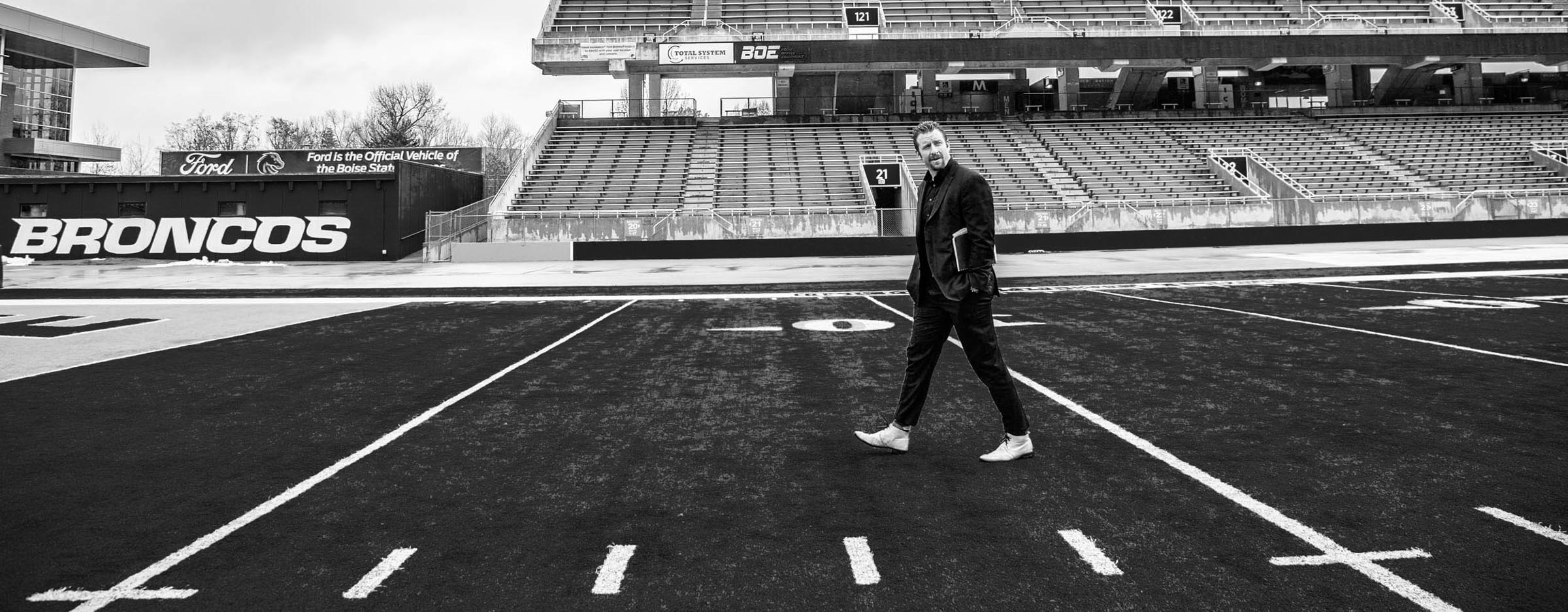
I spoke to the agents and staff at Amherst Madison about this on Tuesday and included some specific details that would make a huge difference in their real estate business. From closing gifts, to negotiations, to target marketing, to their daily telephone calls with customers, clients, and friends, they all have the opportunity to take their business to the next level by consistent attention to detail. The greatest Realtors don’t win because of trick plays, they don’t get the listings and the buyers because of luck, and they don’t sustain a high level of success just because they work hard (although they certainly do). They simply know which details matter the most and they focus on them with an obsessive desire. Simple, but not easy. It takes discipline.
All fields and occupations have their own priorities and critical details which drive results. Athletes can win or lose simply based on having their eyes in the correct place on the ball or on their opponent. The greatest hitters in baseball talk about focusing not just on the ball but on the seams in the ball. A defensive lineman in football does not look at his opponent’s entire body when striking, he will often focus on a single stitch in that opposing lineman’s jersey. As a firefighter, I quickly learned that the habit of thoroughly checking my apparatus and properly donning my personal protective equipment could make the difference between life and death.
Which details are critical to your success? What discipline must you practice in order to move through the Greatness Gap? How often are you “winning in the margins?”
As always, I would love to hear your thoughts or questions regarding this article. Thank you for your time.
NS






